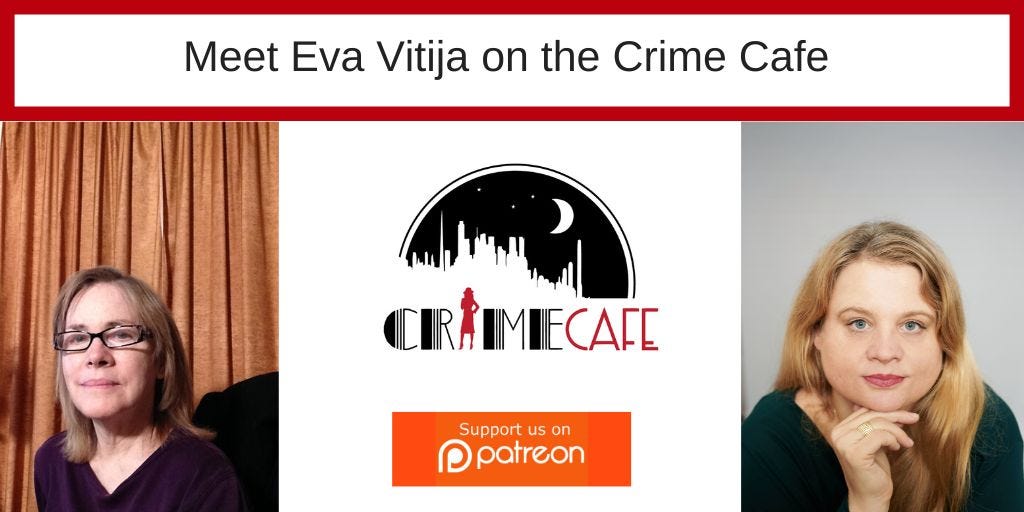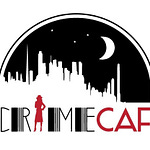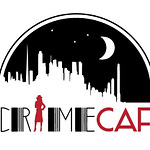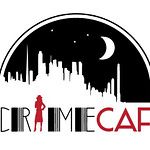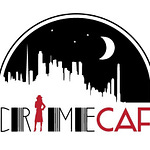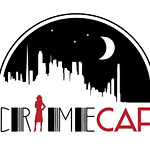Subscribe: Apple Podcasts | Google Podcasts | Spotify | Android | Stitcher | Blubrry | Email | TuneIn | RSS | More
This episode of the Crime Cafe podcast features my interview with screenwriter and documentarian Eva Vitija
Her latest film is a documentary of the life of crime writer Patricia Highsmith. And it’s fascinating stuff! 🙂
Before I bring on my guest, I’ll just remind you that the Crime Cafe has two eBooks for sale: the nine book box set and the short story anthology. You can find the buy inks for both on my website, debbimack.com under the Crime Cafe link. You can also get a free copy of either book if you become a Patreon supporter. You’ll get that and much more if you support the podcast on Patreon, along with our eternal gratitude for doing so.
Check us out on Patreon: https://www.patreon.com/crimecafe
Debbi (00:54): But first, let me put in a good word for Blubrry podcasting.
I’m a Blubrry affiliate, but that’s not the only reason I’m telling you this. I’ve been using Blubrry Podcasting as my hosting service for my podcast for years and it’s one of the best decisions I ever made. They give great customer service, you’re in complete control of your own podcast, you can run it from your own website, and it just takes a lot of the work out of podcasting for me. I find for that reason that it’s a company that I can get behind 100% and say, “You should try this.” Try Blubrry. It doesn’t require a long-term contract, and it’s just a great company, period. It also has free technical support by email, video, and phone, so you can get a human being there. Isn’t that nice?
If you want to podcast, try out Blubrry. No long-term contract, excellent distribution, and great technical support, too, by email, video, and on the phone. I’ve included an affiliate link on this blog.
Download a copy of the PDF transcript of this episode here.
Debbi (00:54): Hi everyone. My guest today is a screenwriter and director, and she has written feature film screenplays as well as made documentaries that have won prizes and been nominated for awards. And if you go to imdb.com and type in her name you’ll discover that she’s made some other really interesting documentaries.
(01:24): One in particular I wanna see now is My Life as a Film. Oh boy, that looks good. <Laugh> That looks really interesting, but her most recent release is a documentary about Patricia Highsmith. Thus, she is on the show because as you know, if you are a crime fiction fan, you know that Patricia Highsmith was the author of Strangers on a Train and The Talented Mr. Ripley, about two very interesting characters. <Laugh> More than two, but anyway, but what you think you know about the author might not be who she really is. So let’s talk about that with my guest. The movie is called Loving Highsmith and my guest is writer and director Eva Vitija. I hope I’m saying that right.
Eva (02:13): Vitija. (Vit-ee-ya)
Debbi (02:14): Vitija. Oh, I knew it. Darn it. I knew it.
Eva: (02:17): It’s fine.
Debbi: (02:17): It’s the Spanish pronunciation. <Laugh> Muy mal. <Laugh>
Eva (02:24): No, no, it’s good.
Debbi (02:26): Very cool.
Eva (02:27): Actually, it’s an Albanian name. So you could–
Debbi (02:30): It’s a what?
Eva (02:31): An Albanian name.
Debbi (02:32): I was gonna say, I was looking it up and I was trying to figure out the roots of it. <Laugh> Very interesting. I just wanna say you are the first working screenwriter/director to appear on this show and a woman. So take that patriarchy. Ha ha.
Eva (02:50): <Laugh> Thank you so much for having me.
Debbi (02:54): I’m glad you’re here. It seems you’ve been fascinated with Patricia Highsmith nearly all your life. What was it that provoked you, your interest as a child in her?
Eva (03:07): Actually it we always went to holidays in the village where she lived. It was a, a small village in the Ticino, which is the Italian part of Switzerland. And it was very well known that she lived there. And my parents told me that this famous writer is living here and alone with her cats and this somehow I was, I must have been around seven or something. And this somehow created a little mystery for me because I couldn’t, you know, quite figure out why a woman is living alone with the cats. <Laugh> The first little mystery, but I think I forgot after that. And I, it only came to my mind when I was already working on that film. So, yeah.
Debbi (03:58): How interesting.
Eva (03:59): That appeared very early on in my life, somehow.
Debbi (04:02): That is very interesting. It’s unique to have a famous writer like that, that everybody knows living in your little village, right?
Eva (04:09): Yeah. <laugh>
Debbi (04:11): To say the least. Almost like being in an Agatha Christie novel <laugh>
Eva (04:17): Yes. Absolutely.
Debbi (04:19): Having seen the movie now I can say that Loving Highsmith seems like the perfect title for this film. Can you tell me what made you choose that title?
Eva (04:31): Actually, I knew Patricia Highsmith as probably everybody else knows her, as this a bit very somber and very elegant crime writer. I also had this, you know, image of hers as being a recluse since I knew she lived alone in Switzerland and we knew all her a bit. How’s it called in, in English? Sometimes I lack the words, but she had this face, you know, not very friendly when she was older. <laugh>
Debbi (05:08): Kind of grim?
Eva (05:10): Grumpy, grim, and quite dark. She had this image. And then I started to read her diaries and her notebooks and they are in an archive in Switzerland because she has been living in Switzerland for the last 13 years of her life there. And when she died, all this came to an archive in Switzerland and I went there and, and I just started reading those private texts, which were not published at that time. And I discovered a woman that was so completely different to everything I had known about her. And that was for, for me, like, you know, this huge surprise because I somehow saw or discovered through these texts a woman that was a very young writer trying to get into profession and always falling in love with women. Every week you could say, or every month, another one. And she was, she had kind of a romantic side to her as well.
(06:22): And this was for me a complete surprise. I would have never imagined such, such a woman. And she somehow was very sympathetic as well. I could all, so from the very first moment I could connect somehow to this, to this woman in these texts. And I think it’s from the start, it was very clear that the love, the love biography of hers, which was so present in these private texts would be the main focus of the film. So Loving Highsmith is a bit about Highsmith who loves, but also about myself or other people who love Highsmith. So <laugh>
Debbi (07:05): Exactly, it does seem to have a kind of a double meaning <laugh>
Eva (07:09): Yes.
Debbi (07:11): There was a side to her that people just didn’t see that came out in these journals and interviews you did. Yeah. What was your process of getting access to the journals and the people you could talk to?
Eva (07:23): Mm-Hmm <affirmative>
Debbi (07:24): Actually, what was that process like?
Eva (07:25): The journals were, or already I could, you know, just go and I read them in the archive for the diaries. I needed a little more, it little needed a little more time because they were not, you know, open to the public yet, but after two years I could also read the diaries and I was always in contact with the publisher, of course, who owns all the rights. So they knew what I was doing and I could, you know, go to the archives, but actually a lot was already, you know, open to the public. And then I contacted at the very first moment, actually, the remaining family of Patricia Highsmith, which doesn’t have the same name. They’re called Coates, not Highsmith. And I was in Texas for a film festival. I just, you know, called them and asked them if I could come by sometime, and half a year later when I was there again, I could visit them. And they were quite open to my request and to my interest somehow. Also, maybe they didn’t know how famous her aunt from Europe was probably. <laugh>
Debbi (08:44): I got the sense that they didn’t know a lot about her. <Laugh>
Eva (08:47): Yeah. Somehow they told me, ah, you know my dentist is he’s Spanish. And he says that in Europe she’s very well known. I mean, they knew that she was writing, they knew she was a writer. They, she had written all those famous books adapted to the screen for films. They knew about that, but somehow they were not aware how big she is, and they told me they still have some boxes of material of hers. And I could just look, look it through. They didn’t know what is, what is inside basically. And it was full of this gorgeous photographs of her as a child and as a young woman. And this was a bit, the start of the filmmaking process, because for a film, you need images. You cannot, cannot only work with texts, of course, which is always the problem when you try to make a film about a writer.
(09:46): You have lots of texts and sometimes nearly no images. And especially when the writer is already passed away. So <laugh>, but with Patricia Highsmith, there was quite a lot of really beautiful photographs of her. And she was a, she was also this very attractive, she was this very attractive, very interesting young woman. So you could immediately imagine to make a film starting from that. And then I contacted her ex-girlfriends. The first that I contacted was also a writer, Marijane Meaker. And she had written this book about Patricia Highsmith because she had lived with her, she had a relationship with her and she had written a book about that time. So it was, it was, I think the first one, I contacted. Also, reading that book, I had a bit, the feeling that she sees it a bit the same as, as I see it.
(10:55): We both had the same vision of the young Patricia Highsmith a bit. She knew her personally, of course, but what, what I had read from her personal diaries I had a bit the same impression. So I wanted to contact her and she was open to a little visit. It was a bit difficult to, you know, do all these travels, but I finally, I could manage to go to the Hamptons <laugh> and we had wonderful chats, but she didn’t, you know, she didn’t want to participate in the first, in the first stages of the project. She didn’t wanna make a film because she said, you know, I’ve already written a book. Why should I now make a film again? I’ve said it all in the book. So I said, okay, but I can’t, you know, make a film without <laugh> people.
Read the rest on Medium.




